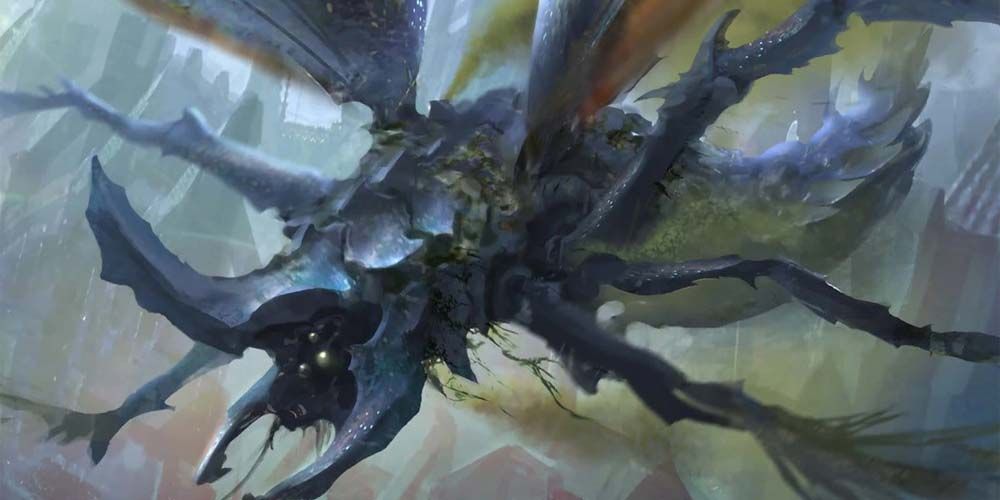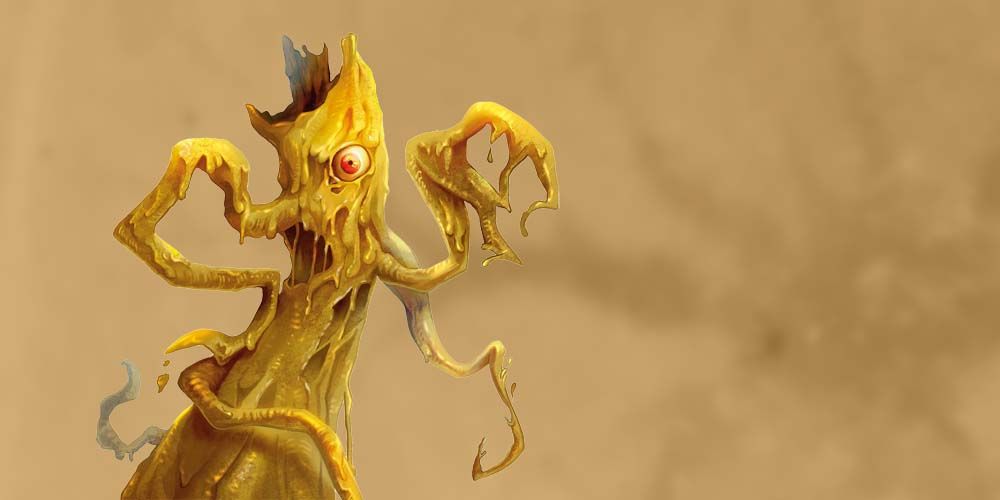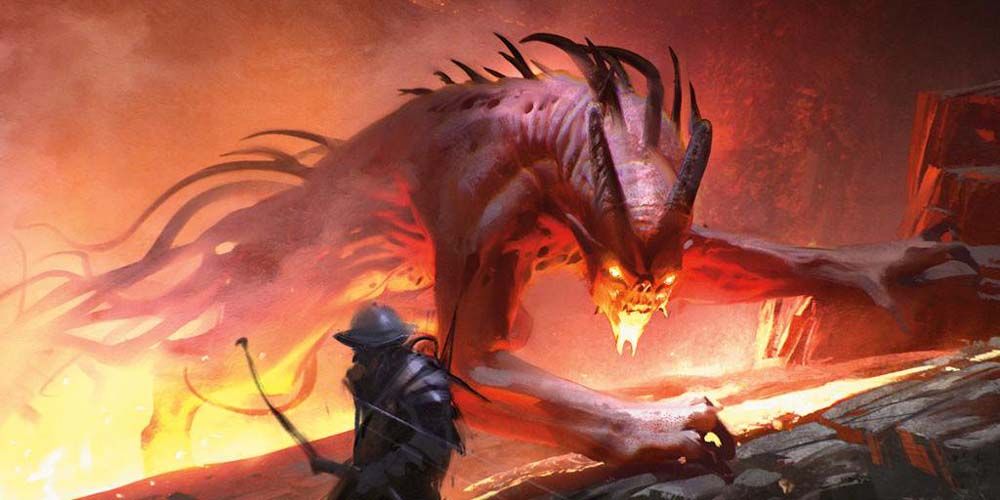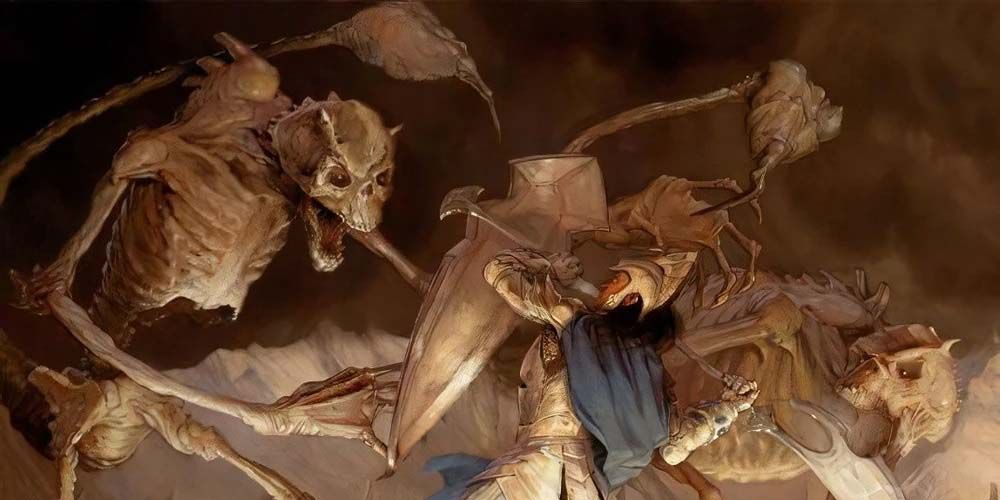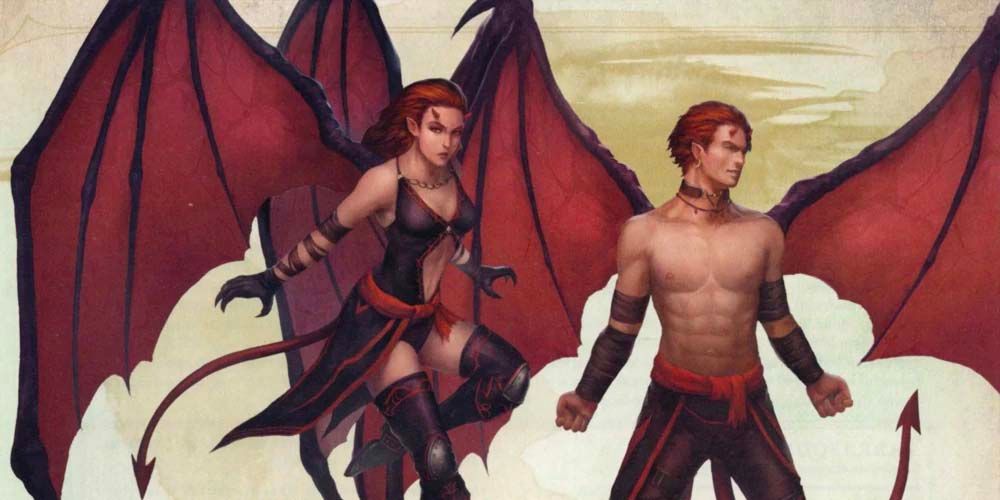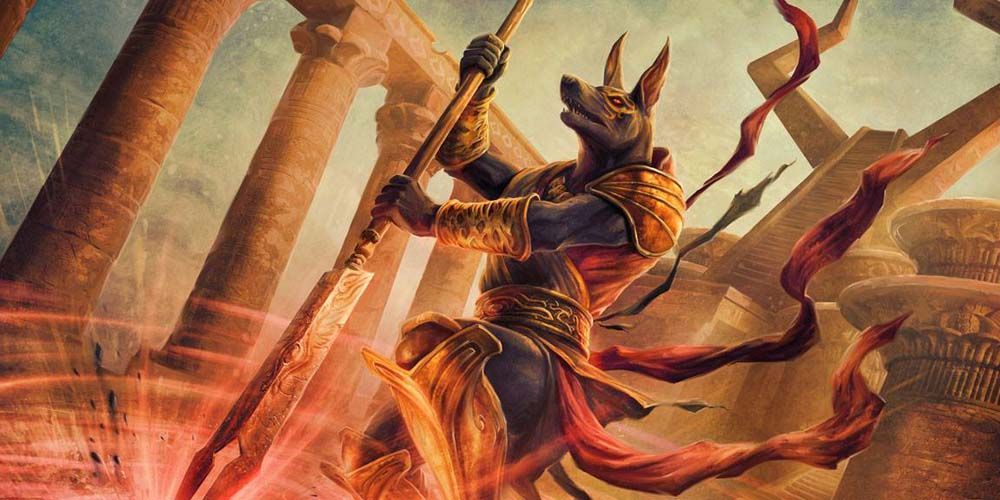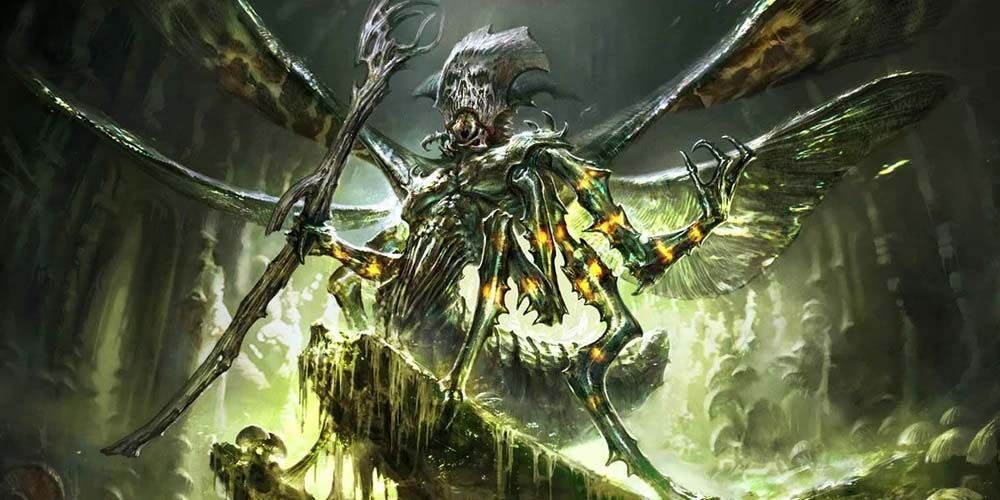In Dungeons & Dragons, fiend is an umbrella term encompassing several groups of evil creatures from the Lower Planes. The lawful devils have a strict hierarchy and inhabit the Nine Hells. Demons, who hail from the infinite Abyss, are chaotic and uncontrollable. Both groups hate each other and are engaged in an endless Blood War of extermination. Yugoloths, who inhabit the planes of Carceri, Gehenna, Hades, and Acheron, occupy a neutral middle ground and will make deals with other evil creatures, though they ultimately serve only themselves. Then there are independent fiends like the succubi and incubi who live on every Lower Plane.
Though they are major antagonists for player characters, fiends are more than just monsters. Many are highly intelligent individuals with their own personalities and lives. A fiendish character would make an interesting challenge for any D&D player, and while they can’t easily coexist with good-aligned players, they could find a way to work with PCs of neutral or evil morality.
10 Chasme Hunt Fugitive Demons
These humanoid insects are interrogators and torturers for demon lords. They love hunting dissidents and deserters and bringing them back for punishment. The monotonous droning of a chasme’s wings lulls other creatures into helpless lethargy, making it easier for the demon to capture prey.
A chasme player character might join a group of adventurers to defeat an incursion of rebel demons that have escaped their ruler. Perhaps the insect fiend decides to stay in the material plane as a bounty hunter, contracting with demons, cultists, and malevolent mortals to hunt down escapees in return for payment in the form of money or souls.
9 Shadow Demons Seek A Purpose Outside the Abyss
Normally, when a demon dies on the mortal plane, their spirit returns to the Abyss to form a new body. However, if their soul is somehow prevented from returning to their home, they become a shadowy, undead being trapped in the world where they were killed. These shadow demons have no connection to the hierarchy of the Abyss and no role to play in fiendish culture.
A shadow demon player might decide to find a new role for themselves in the mortal world, perhaps by gathering minions and companions to build into a cult. Or they might infiltrate the criminal underworld, becoming a powerful crime boss. Mortals may be more willing to work with a shadow fiend since their disconnect from the Abyss means they won’t be constantly trying to harvest the souls of their associates.
8 Mariliths Must Prove Their Worth As Leaders
Possessing the lower body of a serpent topped by the six-armed torso and head of a female humanoid, these demons are keen tacticians, often leading Abyssal armies into battle. The fiend’s extra limbs and whip-like tail grant them multiple attacks, making them deadly foes in single combat.
A marilith player character could be the leader of a small battalion consisting of their adventuring companions and non-player characters. The group might be trapped in a hostile situation, surrounded by enemy troops, dangerous monsters, and deadly terrain. Bullying and brute force may not be enough to motivate the marilith’s troops, so they will have to earn the group’s respect through careful strategy and leadership in order to escape.
7 Yochlols Serve The Will Of Lolth
Yochlols are created by Lolth, the demonic goddess of the drow. They serve only the Demon Queen of Spiders, answering to no other lords. Their natural form is a pillar of yellow slime sprouting tentacles and a massive red eye, though they can also assume the forms of drow women or giant spiders.
Yochlol characters are always on a mission for their goddess, either guarding a temple, retrieving a valuable artifact, or hunting down a foe that has earned the Spider Queen’s anger. They may join up with adventurers to further their goals or may assist a group of drow PCs working on behalf of their patron deity.
6 Imps Obey Evil Wizards
Imps are the errand-runners and servants of the Nine Hells. Unlike many other fiends, they are loyal to their masters and proudly undertake any tasks given to them, though they are slow and distractible while completing their assignments. They can change into animals or become invisible, making them especially useful for spy and sabotage work.
Imps often become familiars for evil magic-users, serving them with the same faithfulness that they display towards fiendish masters. An imp player character works best as such a familiar assisting a spell-casting player. Though imps are loyal, they do have their own agency and will encourage their master towards increasingly evil acts in the hopes that they can eventually claim the mortal’s soul.
5 Hamatula Relentlessly Seek Out Treasure
Hamatula, also called barbed devils, are greedy and constantly looking for treasure and other items to possess. They often serve more powerful devils as guardians of treasuries and vaults, remaining highly alert at all times and never tiring or growing bored with their duties.
A player character hamatula could be driven by a desire for treasure and reward. They might choose to join an adventuring party in order to raid dungeons for gold, jewels, magic items, and other valuables. They might even join a mortal army purely for the desire to gain rewards for their prowess in battle.
4 Osyluths Are Fiendish Detectives
Osyluths, also called bone devils, resemble nine-foot tall skeletons covered in thin, papery skin and bearing venomous scorpion-like tails. They act as a moral police force for devil society, reinforcing fiendish values and punishing transgressors.
An osyluth player character could be part of an adventuring party of supernatural detectives. While their companions investigate ghosts, cults, and other mysteries, the osyluth specializes in cases involving devils who break the rules of lawful evil society by conspiring with demons, non-evil mortals, or even celestials.
3 Succubi and Incubi Use Temptation To Weaken Foes
Though succubi and incubi are thought of as separate types of fiends, they are really just different physical manifestations of the same being and can shift between male and female forms at will. They latch onto a single mortal host and tempt them with new experiences that lead them to acts of cruelty, selfishness, and maliciousness.
Player characters who chose to be a succubus/incubus might find a broader use for their temptation skills. Perhaps they subtly influence a warlord into indulging in debauchery, distracting them from their leadership duties and making it easier for the adventuring party to defeat them. Or they might gain the favor and interest of a powerful wizard, allowing the rest of the party to ransack their laboratory.
2 Arcanoloths Make Effective Negotiators
These jackal-headed yugoloths are master diplomats always on the hunt for new information they can sell. They keep meticulous records of every transaction, alliance, and deal among yugoloth-kind. Though they will work with just about any being that will hire them, they have allegiance only to themselves and will readily sell out their employer if they find a better deal.
Arcanoloth player characters would most likely join an adventuring party as part of a negotiation. Perhaps the group needs to infiltrate dangerous territory in order to form an alliance with orcs or other hostile beings against a greater foe. Or maybe they need to deal with a powerful necromancer whose antagonistic personality must be soothed by the deft skills of an arcanoloth. Throughout the quest, the jackal-headed fiend will be constantly on the lookout for information or new knowledge that they can use in future dealings.
1 Mezzoloths Love To Fight
These humanoid insects are the lowest rank among the yugoloths and make up the majority of their population. They are highly mercenary and will readily enter into service with mortals in return for rewards and the opportunity to fight, though they do not care about glory or honor.
A mezzoloth might choose to become an adventurer purely for combat and rewards. Tired of being at the bottom of the yugoloth hierarchy, they might decide they want to live on their own terms. Or perhaps they just want to battle new foes and experience new challenges on the mortal plane.
-1.jpg)
